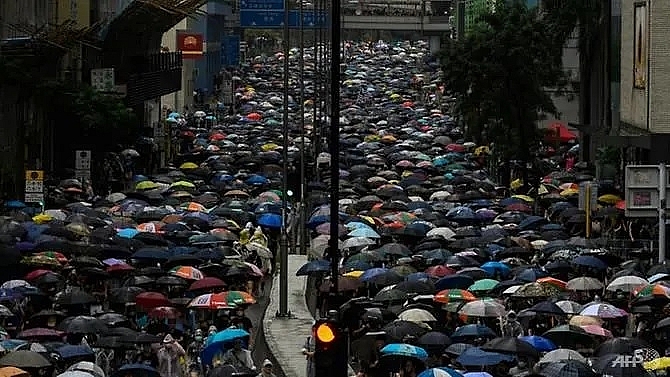G7 leaders back Hong Kong autonomy, call for calm
 |
| The protest movement has plunged Hong Kong into its biggest political crisis in decades. (Photo: AFP/Philip Fong) |
"The G7 reaffirms the existence and the importance of the 1984 Sino-British agreement on Hong Kong and calls for avoiding violence," according to a joint statement issued in French at the end of a G7 summit in Biarritz, southwest France.
British Prime Minister Boris Johnson told reporters the leaders of Britain, Canada, France, Germany, Italy, Japan, the United States and France had all voiced "deep concern" about the situation in Hong Kong.
"The G7 nations all want to support a stable and prosperous Hong Kong and we remain collectively committed to the one-country, two-systems framework," he said.
Hong Kong has been wracked by more than two months of protests over an attempt by its Beijing-backed government to pass an extradition bill which opponents saw as a huge dent in Hong Kong's autonomy.
They have since morphed into a call for greater democracy and police accountability, with youths at the forefront of demonstrations that have at times descended into clashes with security forces.
On Monday, police used water cannons to repel what they termed "extremely violent" demonstrators, following another weekend of clashes at pro-democracy rallies.
Twenty-one officers were injured during the clashes, Hong Kong police said, while dozens of protesters - including a 12-year-old - were arrested for unlawful assembly, possession of weapons and assaulting police.
Officials worldwide have urged Hong Kong authorities to show restraint to avoid serious violence or death.
China has accused former colonial power Britain, which has rebuked Beijing over its handling of the demonstrations, of meddling in the semi-autonomous Chinese territory which the British handed over to China in 1997.
What the stars mean:
★ Poor ★ ★ Promising ★★★ Good ★★★★ Very good ★★★★★ Exceptional
Related Contents
Latest News
More News
- Russian President congratulates Vietnamese Party leader during phone talks (January 25, 2026 | 09:58)
- Worldwide congratulations underscore confidence in Vietnam’s 14th Party Congress (January 23, 2026 | 09:02)
- Political parties, organisations, int’l friends send congratulations to 14th National Party Congress (January 22, 2026 | 09:33)
- 14th National Party Congress: Japanese media highlight Vietnam’s growth targets (January 21, 2026 | 09:46)
- 14th National Party Congress: Driving force for Vietnam to continue renewal, innovation, breakthroughs (January 21, 2026 | 09:42)
- Vietnam remains spiritual support for progressive forces: Colombian party leader (January 21, 2026 | 08:00)
- Int'l media provides large coverage of 14th National Party Congress's first working day (January 20, 2026 | 09:09)
- Vietnamese firms win top honours at ASEAN Digital Awards (January 16, 2026 | 16:45)
- ASEAN Digital Ministers' Meeting opens in Hanoi (January 15, 2026 | 15:33)
- ASEAN economies move up the global chip value chain (December 09, 2025 | 13:32)

 Tag:
Tag:




















 Mobile Version
Mobile Version